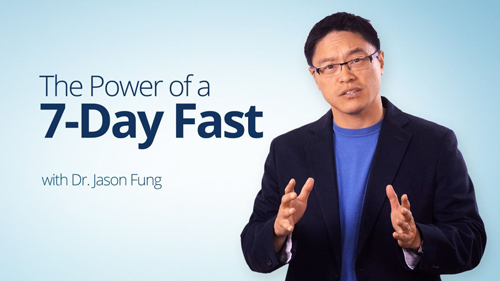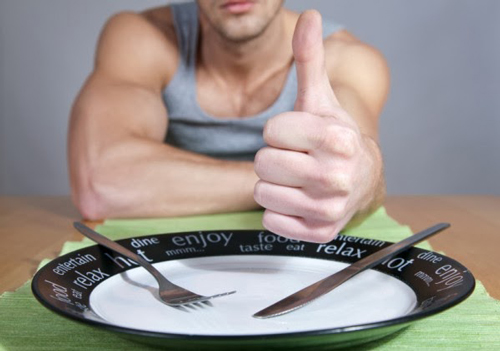Fasting Does Not Burn Muscle: Here’s The Proof
Dr. Jason Fung, among multiple other scientists, explains how fasting does not burn muscle. It’s one of several common myths surrounding the practice of fasting.
Science and human evidence show how beneficial fasting can be for multiple diseases as an appropriate dietary intervention, so why don’t we ever hear about it from our health regulatory agencies?

Fasting is gaining a lot of popularity, and anyone considering it should consult an expert in this practice in order to go about it in the safest way possible, as it can be potentially dangerous for someone who doesn’t know much about it or if they have an underlying medical condition. That being said, if done correctly, it has tremendous health benefits and is safe for the majority of people who try it.
Fasting has been shown to extend life, protect against neurodegenerative diseases like Alzheimer’s, kill cancer, reverse type 2 diabetes, and much more. It also activates autophagy, the body’s self-cleaning system, which allows the cell to get rid of old cell machinery, breaking them down into smaller parts to be reused by the cell.
Activating autophagy through fasting has neuroprotective and immuno-regenerative benefits. Furthermore, it produces ketone bodies within the blood that also have a number of health benefits. Repeated and consistent results have shown how eating less food overall, eating healthier, and eating less frequently can have a number of significant beneficial effects on a large array of biological functions and systems.
Almost 10 years ago, a scientific review of multiple studies on fasting was published in The American Journal of Clinical Nutrition. It examined a multitude of both human and animal studies and determined that fasting is an effective way to reduce the risk of cardiovascular disease and cancer. It also showed significant potential in treating diabetes. Again, that was 10 years ago. Today, the research has progressed tremendously, and there is a lot more information available out there for those who are interested.
Big Pharma Doesn’t Like It
Fasting is an ancient health practice, but modern day science has confirmed its health benefits. It can be one of the most powerful health interventions to rejuvenate your health or to battle a certain disease, yet we don’t hear about it because pharmaceutical companies can’t really make any money off people fasting.
“Why is it that the normal diet is three meals a day plus snacks? It isn’t that it’s the healthiest eating pattern, now that’s my opinion but I think there is a lot of evidence to support that. There are a lot of pressures to have that eating pattern, there’s a lot of money involved. The food industry — are they going to make money from skipping breakfast like I did today? No, they’re going to lose money. If people fast, the food industry loses money. What about the pharmaceutical industries? What if people do some intermittent fasting, exercise periodically and are very healthy, is the pharmaceutical industry going to make any money on healthy people?” – Mark Mattson, Chief of the Laboratory of Neuroscience at the U.S. National Institute on Aging.
Does Fasting Cause Muscle Loss?

Dr. Jason Fung is a Toronto based nephrologist. He completed medical school and internal medicine studies at the University of Toronto before finishing his nephrology fellowship at the University of California, Los Angeles at the Cedars-Sinai hospital. He joined Scarborough General Hospital in 2001 where he continues to practice and transform people’s lives. Below he dispels one of the many myths regarding fasting, that it causes muscle loss, in no uncertain terms: “It seems that there are always concerns about loss of muscle mass during fasting. I never get away from this question. No matter how many times I answer it, somebody always asks, ‘Doesn’t fasting burn your muscle?’ Let me say straight up, NO.”
Dr. Fung outlines a critical point. When you fast and deplete all your glycogen, your body is going to start using fat for energy. It starts going to used, damaged cells for energy, and it’s basically going to use all of the bad things first before it gets to the good things, which takes a lot of time. Your body will not burn protein, as protein is not a fuel source. When fasting, Dr. Fung explains how your protein is actually the last thing to go because it’s so important.
“Muscle gain/ loss is mostly a function of EXERCISE. You can’t eat your way to more muscle. Supplement companies, of course, try to convince you otherwise. Eat creatine (or protein shakes, or eye of newt) and you will build muscle. That’s stupid. There’s one good way to build muscle – exercise. So if you are worried about muscle loss – exercise. It ain’t rocket science. Just don’t confuse the two issues of diet and exercise. Don’t worry about what your diet (or lack of diet – fasting) is doing to your muscle. Exercise builds muscle. Clear?”
Dr. Fung makes it clear that fasting does not burn your muscle, unless you take it to a very extreme level, and that’s something neither he nor we are recommending here.
Clinical Evidence
There is also clinical evidence showing that fasting does not cause muscle loss. For example, a 2010 study of alternate daily fasting showed that patients were able to lose a lot of fat mass with no change in lean mass. Several metabolic benefits were also observed.
A study from 2016 compared intermittent fasting with daily calorie restriction. The intermittent fasting group lost only 1.2 kg of lean mass compared to 1.6 kg in the calorie restriction group. Comparing the percentage increases in lean mass, the fasting group increased by 2.2% compared to 0.5% in the calorie restriction group, showing that fasting may be up to 4 times better at preserving lean mass according to this measure. Importantly, the fasting group lost more than double the amount of the more dangerous visceral fat. When you fast, and do it right, it’s probably the most effective way to get rid of visceral fat.
Despite the concerns that fasting may cause loss of muscle, the long human experience as well as human clinical trials show the exact opposite. Intermittent fasting seems to preserve lean tissue better than convention weight loss methods, says Dr. Jason Fung.
That being said, Fung also mentions body type.
Exactly how much protein is needed during fasting really depends upon the underlying condition. If you are obese, then fasting is very beneficial and you will burn much more fat than protein. If you are quite lean, then fasting may not be so beneficial, as you will burn more protein. This seems rather obvious, but our body is really quite a bit smarter than we give it credit for. It can handle itself during feeding, and during fasting. How exactly the body is able to make this adjustment is currently unknown.
Exercise and Protein

Researchers from McMaster University also published a study showing that caloric restriction combined with exercise did not deplete muscle, and those who consumed enough protein actually saw gains. The authors emphasized how exercise, particularly lifting weights, provides a signal for muscle to be retained even when you’re in a big calorie deficit. The group that did not have a lot of protein during calorie restriction didn’t see any muscle gains, but experienced no muscle loss.
Consuming protein and eating after a workout when you’ve fasted beforehand is important for muscle growth. But some people would be fine continuing their fast, keeping protein intake down, thus lowering their IGF-1 growth hormone levels (which also happens when you fast). When this happens, your body is in autophagy, damaged cells are repairing themselves, and your body is eating what it wants to get rid of. It’s a very healthy process.
The point is that you’re not going to lose muscle if you fast. Here is just one of the many testimonials to prove this: “I am someone who constantly exercises at the end of a 15-24 hour fast, and then I feed myself after. So far, the results I’ve seen have been great, and whenever I fast and then work out, my energy levels are always very high. But everybody is different, you just have to find what works for you. I have been fasting for more than 10 years so my body has adjusted and it is quite used to it. To me, my body feels like it prefers it, especially when I can keep on track.”
There are multiple experts in this field, and another one apart from Dr. Fung is Dr. Valter Longo, the Edna Jones Professor in Gerontology and Professor in Biological Science at USC. He is also the Director of the USC Longevity Institute.
The Takeaway
For someone struggling to lose weight, or struggling with a disease like cancer or type 2 diabetes, fasting can be of assistance. In general, why do we eat so much? Why are we taught to eat so much throughout the day, and why are government food recommendations completely the opposite of what health science is telling us? We have to take matters into our own hands and do research ourselves instead of relying on outside authorities if we truly want to maximize our health.
yogaesoteric
June 22, 2019
